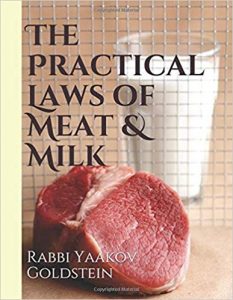What is the law if a drop of hot milk or chicken soup spritzed onto a cold dairy/meaty vessel or food?
If one removed a hot pot of Issur or meat from the fire, and while moving it, a single drop spritzed onto a cold Kosher/dairy food or pot, then if by the time the drop hit the pot it was no longer Yad Soledes, everything remains permitted. If, however, the drop was Yad Soledes by the time it hit the food or pot, then its law is subject to a debate brought in Poskim regarding the status of Nifsak Hakiluach.[1] Some Poskim[2] rule that if the drop fell on a food, the food would require 60x the drop. Likewise, if it fell on a vessel, the vessel needs to be Kashered.[3] Other Poskim[4] rule that if the drop fell on a food, the food would require 60x the drop, and if it fell on a vessel, the vessel is Kosher. Other Poskim[5] rule that whether the drop fell on a food or vessel everything remains Kosher. [Practically, regarding Basar Bechalav, one may be lenient to use the vessel after 24 hours.[6]]
Davar Gush-A solid item that fell:[7] The above dispute and subsequent ruling is only applicable in a case that a drop of liquid fell out of a Keli Rishon pot, onto a food or vessel. If, however, a hot Yad Soledes solid fell onto it, then the above dispute is not relevant, and it would follow the classical rule of Tatah Gavar which prohibits the food or vessel one peels worth. [Thus, if a piece of hot meat fell onto a dairy vessel, or a piece of hot cheese dripped onto a meat vessel, the vessel must be Kashered.]
_____________________________________________________________________[1] This term means as follows: If the flow of food from the Keli Rishon was no longer attached to the pot by the time it contacted the food, or vessel, such as when a single drop of liquid spritzed from the Keli Rishon pot onto a food, then this is defined as Nifsak Hakiluach. If the flow of food from the Keli Rishon was still attached to the pot by the time it contacted the food, or vessel, such as when a stream of liquid spilled from the Keli Rishon pot onto a food, then this is defined as Lo Nifsak Hakiluach. The above case scenario is only referring to a case of Nifsak Hakiluach.
[2] Shach Y.D. 105:5 “And even with an Iruiy Shenifsak Hakiluach it nevertheless transfers taste to a Kelipa worth according to all opinions.”; Shach 91 :7; Beir Heiytiv 105; Yad Yehuda 105 Aruch 10; 91 Aruch 12 and Katzar 14; Lechem Hapanim Dinei Iruiy; Chochmas Adam 59:2; P”M 91 S”D 7; P”M O.C. Hanhagos Hanishal, brought in Darkei Teshuvah 105:64 even regarding Basar Bechalav; Kaf Hachaim 105:31;
[3] Yad Yehuda 105 Aruch 10; 91 Aruch 12 and Katzar 14; 92:48 and 64; Implication of P”M 92 S.D. 34; Yad Avraham 92; Degul Merivava 92:7; Poskim brought in Darkei Teshuvah 68:58 and 105:64; It is implied from the above Poskim ibid that this applies even by Basar Bechalav
[4] Erech Hashulchan 105:7 and Darkei Teshuvah 105:64 in name of Beir Yaakov regarding all vessels, even earthenware; Minchas Yaakov on Toras Chatas 55:15; 57:15-16 regarding metal vessels that it requires Greida and not Kelipa, but earthenware requires a Kelipa; P”M 92 S.D. 38 in name of Minchas Yaakov ibid; Kaf Hachaim 105:32; Yad Efraim 92:7 is stringent by other Issurim to prohibit Kelipa of food if no loss although permits vessel after 24 hours, by Basar Bechalav he is completely lenient by both food and vessel; Teshuos Chein 6 permits vessel after 24 hours
[5] Implication of Rama 92:7 [however the Achronim don’t learn this way]; Implication of Admur 451:32; Peri Chadash 105:18 [however he is of the opinion that a Keli Sheiyni transfers taste]; Kreisy Upleisy 105:8; Yad Efraim 92:7 in name of Chemed Moshe in name of Orach Mishor that one may permit by Nifsak Hakiluach especially by Basar Bechalav being its only Rabbinical;
Ruling of Admur: Admur in 451:32 states, “Vessels that have absorbed Chametz through a Keli Sheiyni, such as eating spoons which are used to eat from the bowl, which is a Keli Sheiyni (after the stream has stopped from the Keli Rishon), are Kashered through Hagala in a Keli Rishon.” The words in parentheses imply that Nifsak Hakiluach has the status of Keli Sheiyni; See Piskei Admur Hazakein on Y.D. p. 34 who learns according to Admur 451:29 that Nifsak Hakiluach is not like a Keli Sheiyni, and possibly absorbs into a vessel. However, no mention is made there of Admur 451:32 who seems to learn that it does have the same status as a Keli Sheiyni, and it is only regarding the Chumra of a Keli Sheiyni that the above ruling in 451:30 was said.
[6] There is greater room to be lenient by Basar Bechalav as it is only a Rabbinical prohibition in this case.
[7] See Michaber 91:4; 105:3 and 6; Shach 91:7




Leave A Comment?
You must be logged in to post a comment.